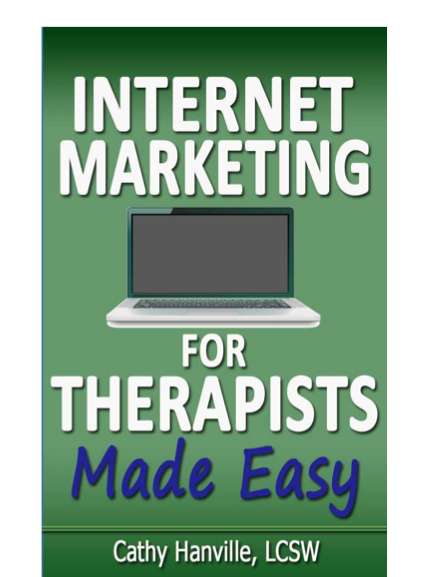Are you a social worker or other mental health provider who would like to create your own website? Are you also rather new to the world of social media?
If yes, you are likely to find the e-book Internet Marketing for Therapists Made Easy by Cathy Hanville, LCSW, very helpful.
This e-book covers the following topics:
- Website design
- Search engine optimization (SEO)
- Writing a blog
- Social media basics (and reasons for using)
- Social media ethics
- Google, Facebook, Twitter, LinkedIn
- Internet marketing plan
- Measuring success
- A picture conveying both warmth and professionalism
- An about page describing you and your approach
- Your contact information on every page [to make it as easy as possible for potential clients to reach you]
- The descriptive text for the site should be about 80% what you can do for your clients and 20% about yourself
- A fees page; you can also take this opportunity to discuss any sliding scale or insurance plans that you may accept
- Your intake paperwork; this saves valuable time during the first session with your client
- Fresh content
- Keyword rich content
- Good title tags (i.e., alt tags to tell Google what the picture is)
- Internal links
- Reputable inbound links
- Social media engagement
80% of these adults looked for health info online
15% used social media specifically to find health info
Furthermore, social media plays a role in how the SEO for websites is determined. A site receiving +1s on Google or likes on Facebook will have a higher search engine ranking than one that is not garnering any social media ratings.
Ethical Guidelines for Social Media:
- Do not friend clients (or former) clients on Facebook.
- Do not follow clients on Twitter; they may follow you.
- Do not add clients to your circles on Google+, clients can add you to their circles.
- Do not connect to clients (or former clients) on LinkedIn.
- Never ask for endorsements or testimonials from clients (or former clients).
- Include verbiage about social media in your informed consent (to ensure clarity of your boundaries to your clients from the get-go).
- Talk about these issues in session if there is a need to do so.
Cathy subsequently proceeds to walk you through how to set up a profile and network via Google, Twitter, Linkedin and Facebook with many detailed screen shots etc. so that even if you are a beginner who has never used any of these platforms before, you will be able to know how and what to do with each one of these four social media mediums.
What Type of Marketing Goals Might You Have?
The typical marketing plan around a therapist’s website usually involves goals such as:
- Attracting new clients
- Networking
- Highlighting your expertise
- Raising your website’s SEO
What Are Some Ways to Track Your Results?
- Google Analytics
- Ask new clients how they found you (and track over time)
- Ask new clients why they specifically chose you (and track over time)
- Facebook’s Insights provides helpful analytics (which content is shared, how many people see that content)
Overall, I found Cathy’s e-book to be a useful aide on the topic of online marketing for therapists, particularly for clinicians who are new to the world of social media. That said, I felt that she could have further developed the chapters on website design, SEO and measuring success.
For example, on website design, a discussion of the pros and cons of wordpress vs. google blogger was missing.
Re SEO, there was no mention of some of the major plug-ins that you could install on your website to assist with this such as SEO Friendly Images that addresses the alt tag requirement.
Lastly, in the Measuring Success chapter, an explanation of how to use/interpret Google Analytics would have been a valuable addition. This is because this tool is a rather tricky one for even experienced bloggers to master.
Personal Note: It was very time-appropriate for me to be reading Cathy’s book right now because I am providing some consulting to a social worker/community manager who has been charged with the task of creating a wordpress website for her organization.
What your thoughts about this topic? If you have a website, have you found it to be a helpful marketing tool for your area of expertise?
Disclosure of Material Connection: I received one copy of the book mentioned above for free in the hope that I would mention it on my blog. In addition, the link to this book is an “affiliate link.” Regardless, I only recommend products or services I use personally and believe will be good for my readers. I am disclosing this in accordance with the Federal Trade Commission’s 16 CFR, Part 255: “Guides Concerning the Use of Endorsements and Testimonials in Advertising.”
*Pew Internet and Family Life Research reported in May 2011


